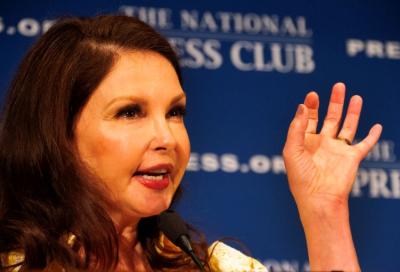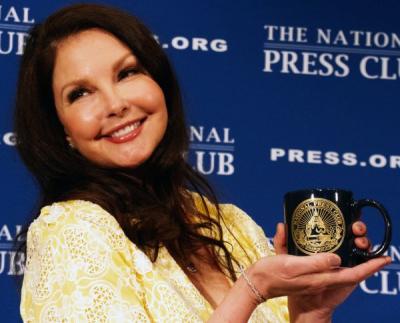The family’s heartache was exacerbated not only by Tennessee’s open records law but by media coverage of the videos and recordings. Many news organizations outside of Tennessee hired state residents to obtain the grisly photos and other records to publicize them worldwide. More than a year after the event, the prurient interest of the press and the public continues to re-victimize Naomi Judd’s family.
Activist Ashley Judd calls on journalists to use common sense in reporting on suicides
On that day of unimaginable horror — April 30, 2022 — Ashley Judd called 911 to report that she had just found her mother, renowned country singer Naomi Judd, in her bed, dying by suicide. Little did she know, she told a National Press Club Headliners luncheon on May 9, that that emotional call would become public record, available to any resident of Tennessee on the internet.
But it would get worse. Shocked and grief-stricken, the actor and activist spent the next four hours undergoing an invasive, clumsy interrogation by police, who asked again and again what had driven her mother to take her life. An EMT yelled at her. And during that time, no one told her she was being recorded on a body cam, or that all the recordings and photographs of Ashley Judd’s grief and her mother’s bloody body would also become public fodder for state residents.

“The media has a grave responsibility,” Judd said. “Just because a police record is public does not mean you should report it…. What the law does not constrain, common sense should … I am here to exhort the media to hold yourselves to the reporting standards established by the American Foundation for Suicide Prevention guidelines.”
These guidelines recommend using the term “died by suicide,” rather than “committed suicide,” because people commit crimes, and suicide is not a crime but the result of an illness. Reporting should not delve into salacious details of the suicide as it can encourage copycat suicides among vulnerable people, as more than 100 studies have shown, especially if the person who died was a celebrity. Journalists are advised to include the suicide prevention hotline number in every suicide story. A suicide story should not appear on the front page of a newspaper or at the top of a broadcast which may seem to glamorize the deed. More details on the media guidelines for suicide reporting can be found here.
Judd asked members of the media to sign the Dear Media Pledge at NaomisLaw.org, where they can promise to report on suicide in terms of dignity for the deceased as well as their families.
In addition to pushing for media guidelines, Judd has helped craft a new bill in the Tennessee legislature that would limit access to death records, investigative reports, autopsy reports, recordings, photographs and 911 calls relating to a death if law enforcement determines the death was not the result of a crime.
“Police should ask for consent before recording,” she said. “No one is served by listening to the shock, dismay, and distress in my voice on the 911 call.” She added that lobbyists for public access to law enforcement records are pushing back strongly against the bill.
Ashley Judd is not new to advocacy. In 2010, she spoke at the Club on the environmental disasters caused by mountaintop removal mining in Appalachia. She is a strong activist for gender equality and a United Nations Population Fund Goodwill Ambassador who has traveled to 22 countries, visiting brothels, refugee camps, hospices and slums. She was Time magazine’s Person of the Year in 2017 as one of the Silence Breakers, and in 2019, the UN honored her as Global Advocate of the Year.
The past year, however, her activism has become deeply personal.
“We deserve to be remembered for how we lived and not how we died,” Judd said. “We need to see the person through the disease.” And, as she pointed out, her mother was more, much more than depression, lurid photos and the emotional recordings that will haunt her family in perpetuity.
'She was my momma'

Naomi Judd was born to a hardworking family in Kentucky.
A smiling, happy child, she firmly believed there was a crocodile in the basement named Gillette for his razor-sharp teeth.
Pregnant at seventeen, she gave birth to Wynonna Judd, with whom she would in 1983 form the award-winning musical group The Judds, country music’s most famous mother-daughter team, with 20 top hits, including 15 No. 1's.Five years after Wynonna’s birth, Ashley arrived. Raising two daughters alone, sometimes on public assistance, each year Naomi managed to hide a bevy of
Easter eggs for her daughters to find in their tiny apartment where she bedded down on the floor.
She led a life of incredible accomplishment, from humble beginnings to the pinnacle of country music stardom, selling tens of millions of records.
Despite fame and fortune, she remained refreshingly down-to-earth. Her favorite store was Costco, and when she saw a child having a meltdown there, she would ask the parents if she could help.
She could never leave a movie theater in a timely manner because she would stay, signing autographs for anyone in the lobby who wanted one.
She was a woman of intellectual, as well as musical, brilliance. Her favorite hobby was reading about neuroscience.
In 2017, Ashley Judd asked her mother if she should go on the record citing sexual harassment by Hollywood producer Harvey Weinstein for The New York Times article by Jodi Kantor and Megan Twohey that effectively launched the #MeToo movement. With her characteristic encouragement, Naomi replied, “Oh, honey! Go get 'em!”
And, most of all, Judd said, her voice cracking with emotion, “She was my momma.”
